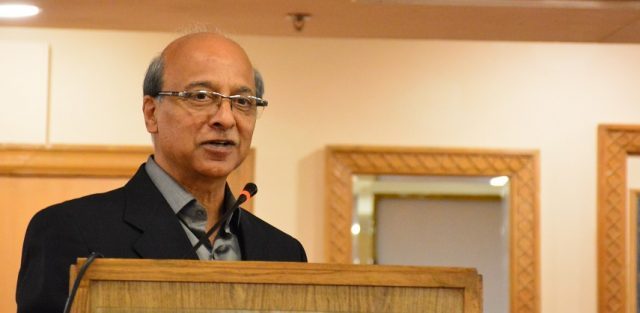Dr. Zafar Nawaz Jaspal |
Prime Minister Imran Khan’s cabinet has started working. The ministers are making promising announcements. The critics seem unconvinced with the claims of the newly-elected government. Indeed, it’s too difficult to profess accurately about the performance of the new government. Nevertheless, Premier Khan has stimulated optimism in the masses. The new government is encountering a range of problems: domestic terrorism, terrible relationships with neighboring India and Afghanistan, increasing mistrust with the United States, once a major ally, and a fragile economy.
The economic condition of the country is alarming and thereby it needs an immediate bailout package. In addition, the government has to chalk out a practical strategy to relieve the country from the Financial Action Task Force’s “grey list” of state sponsors of terrorism. Pakistan was added in it on the behest of United States to pressurize Islamabad to intensify a crackdown on extremist groups. What is a modus operandi?
Mr. Qureshi boldly stated that the feedback from other organizations or departments is imperative in the making of foreign policy, but the foreign policy of Pakistan will be constituted in the Ministry of Foreign Affairs.
Premier Khan promised to act rationally in addressing both national security and foreign policy challenges. He offered dialogue process to the archrival India to resolve the bilateral disputes and continue supporting the peace process in Afghanistan. He also announced a constructive engagement with the United States, Iran etc. He stated to make China-Pakistan Economic Corridor as a game changer. Theoretically, pursuing these objectives is possible, but practically very difficult.
The newly-appointed Foreign Minister Shah Mahmood Qureshi, in his maiden press conference, pledged that Pakistan’s new foreign policy would “begin and end at Pakistan.” Certainly, the country’s foreign policy has to protect and promote the national interest of the state. The error of the judgment cannot be ruled out. The statement of the incumbent Foreign Minister generates an impression that previous government’s foreign policy had failed to serve the national interest of Pakistan, adequately.
Read more: Challenge for the New Government; Constraining its Capacity to Finance –…
Mr. Qureshi boldly stated that the feedback from other organizations or departments is imperative in the making of foreign policy, but the foreign policy of Pakistan will be constituted in the Ministry of Foreign Affairs. He said: “There are pre-conceived notions about where the foreign policy of Pakistan was formulated. Let me be clear: the foreign policy will be made here at the Foreign Office of Pakistan.” Importantly, Pakistan Tehrik-Insaf (PTI) manifesto assures the revamping of Foreign Ministry to cope with the contemporary challenges in the anarchical international society.
However, the manifesto is silent about the plausible restructuring framework of the Ministry. The critics of the Ministry are convinced that without reform, the performance of the institution cannot be improved. Conversely, many foreign policy analysts opine that without maximizing the autonomy of the institution and improving the domestic situation of the country maximizing the gains in the external environment are problematic.
The rising strategic competition between China and the United States and increasing instability in Afghanistan are detrimental for Pakistan and the United States ties.
The volatile anarchical situation of Afghanistan is destabilizing for Pakistan. The increasing intensity in Afghan Taliban’s operations not only exposes the limitations of the Afghan unity government and incapability of the United States-led NATO forces but also increases the mistrust between Kabul and Islamabad. Mr. Qureshi is a seasoned politician and was the Foreign Minister in the Government of Prime Minister Gilani. He understands the situation, therefore, one can be optimistic.
Foreign Minister also endorsed the caretaker government’s pact with Kabul i.e. Afghanistan-Pakistan Action Plan for Peace and Solidarity (APAPPS) signed on July 22, 2018, at Kabul. He stated: “I want to tell the people of Afghanistan we need to become each other’s support base. And we have the capability to become a good support mechanism for each other. I have heard that we have a bilateral agreement in place which has five tracks and we want to move forward with those.” Perhaps, it’s a smart move to continue the constructive initiative of the previous government.
Read more: Governance challenges the new government faces
The relations with the United States have gradually been deteriorating. The Trump Administration has been pressurizing Pakistan. Recently, it suspended the International Military Education and Training Program (IMET) grant for Pakistani armed forces. The United States Defence Authorisation Act-2019 (NDAA-19) permitted $150 million security-related aid to Pakistan, which is significantly less than the $700 million that was authorized through the Coalition Support Fund last year. Perhaps, the suspension of Americans’ military assistance and lessening the Fund is challenging for the new government.
Read more: Pakistan’s ‘new’ foreign policy under Imran Khan
It was reported that the US Secretary of State Mike Pompeo would be visiting Pakistan at the beginning of next month. His visit may provide an opportunity to the new government to mitigate mistrust between Islamabad and Washington. However, the trends are not favorable. The rising strategic competition between China and the United States and increasing instability in Afghanistan are detrimental for Pakistan and the United States ties. Thus, it will be a daunting task for the new government to maximize Pakistan’s national interest in the transforming global politics.
Dr. Zafar Nawaz Jaspal is Associate Professor, School of Politics and International Relations, Quaid-i-Azam University, Islamabad. He is also an advisor on Non-Proliferation to SASSI, London and a course coordinator at Foreign Services Academy for the Pakistan Ministry of Foreign Affairs. Email: jaspal_99@hotmail.com. This piece was first published in Pakistan Observer. It has been reprinted with permission. The views expressed in this article are the author’s own and do not necessarily reflect Global Village Space’s editorial policy.













